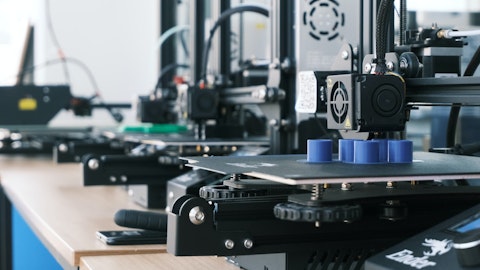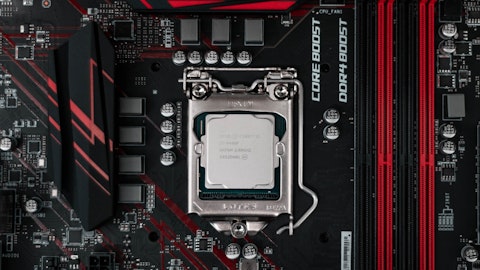In this article, we discuss 5 stocks that will benefit from the CHIPS Act. If you want to see more stocks in this selection, click 10 Stocks That Will Benefit from CHIPS Act.
5. Intel Corporation (NASDAQ:INTC)
Number of Hedge Fund Holders: 76
Intel Corporation (NASDAQ:INTC), the American multinational technology corporation that produces semiconductor chips as well as specializing in computer hardware, automation, and artificial intelligence, is undoubtedly the largest beneficiary of the CHIPS Act. The Act would allow Intel Corporation (NASDAQ:INTC) to build factories and grant the company an investment tax credit to purchase tools and equipment for its new facilities. Intel Corporation (NASDAQ:INTC) said earlier this year that it would spend $20 billion on a factory in Ohio, which will likely be subsidized by the CHIPS Act and the FABS Act would lend it another $5 billion to $10 billion to equip the factory.
Northland analyst Gus Richard on August 1 observed that Intel Corporation (NASDAQ:INTC)’s valuation is now less than AMD, and he believes that Intel Corporation (NASDAQ:INTC)’s manufacturing scale is valuable to the U.S. Department of Defense and will “persevere in one form or another”. If Intel Corporation (NASDAQ:INTC) “continues to stumble,” he forecasts the breakup value to be $235 billion or $57 per share, and so he sees “little downside risk and a lot of upside,” even if the company does not execute, given this breakup value and de-risked estimates, robust valuation support, and a 4% dividend yield. He maintained an Outperform rating and a $55 price target on Intel Corporation (NASDAQ:INTC) shares.
Among the hedge funds tracked by Insider Monkey, 76 funds reported owning stakes in Intel Corporation (NASDAQ:INTC) at the end of Q1 2022, up from 72 funds in the prior quarter. Seth Klarman’s Baupost Group is the largest shareholder of the company, with 16.5 million shares worth $822.3 million.
Here is what O’Keefe Stevens Advisory has to say about Intel Corporation (NASDAQ:INTC) in its Q1 2022 investor letter:
“Intel announced they are removing stock-based compensation from non-GAAP earnings in 2022 to report results aligning with semiconductor peers. This may seem like a reasonable thing to do as comparability between peers becomes easier. On the other hand, what exactly is the point of adjusted earnings? It is not to conform to some industry norm or because the management teams need to make performance metrics. The point of adjusting earnings is to present results in a light that more closely reflects the actual underlying performance of the business. That is, backing out expenses that might be one-time in nature, such as legal or fire expenses. First off, share-based compensation is an actual expense. Decreasing my ownership stake in a company without receiving any compensation is not free. If a company paid its employees in all stock, would they add back the entire SBC? What a margin profile that would be. Second, should a company be worried about reporting results similar to other companies? Every company is unique. Management should not waste time determining what expenses should be excluded. Run the business, don’t worry about adjusting the numbers.”





